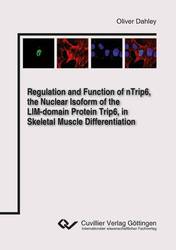| Fachbereiche | |
|---|---|
| Buchreihen (97) |
1382
|
| Nachhaltigkeit |
3
|
| Gesundheitswesen |
1
|
| Geisteswissenschaften |
2372
|
| Naturwissenschaften |
5408
|
| Mathematik | 228 |
| Informatik | 320 |
| Physik | 980 |
| Chemie | 1364 |
| Geowissenschaften | 131 |
| Humanmedizin | 243 |
| Zahn-, Mund- und Kieferheilkunde | 10 |
| Veterinärmedizin | 108 |
| Pharmazie | 147 |
| Biologie | 835 |
| Biochemie, Molekularbiologie, Gentechnologie | 121 |
| Biophysik | 25 |
| Ernährungs- und Haushaltswissenschaften | 45 |
| Land- und Agrarwissenschaften | 1005 |
| Forstwissenschaften | 201 |
| Gartenbauwissenschaft | 20 |
| Umweltforschung, Ökologie und Landespflege | 148 |
| Ingenieurwissenschaften |
1798
|
| Allgemein |
98
|
|
Leitlinien Unfallchirurgie
5. Auflage bestellen |
|
Erweiterte Suche
Regulation and Function of nTrip6, the Nuclear Isoform of the LIM-domain Protein Trip6, in Skeletal Muscle Differentiation
Oliver Dahley (Autor)Vorschau
Leseprobe, PDF (130 KB)
Inhaltsverzeichnis, PDF (59 KB)
Muscle tissue in higher vertebrates consists of slow twitch (type I) and fast twitch (type II) muscle fibers. This fiber type identity is determined by the set of genes, either type I/slow or type II/fast that the fiber expresses. One of the main transcription factors controlling fiber type identity is Mef2c, which drives the expression of type I/slow genes. However, Mef2c is expressed in both type I/slow and type II/fast fibers. Thus, its activity needs to be differentially regulated in the two different fiber types. Here I report that nTrip6, the nuclear isoform of the LIM-domain protein Trip6, acts as a co-repressor for Mef2c. nTrip6 interacted with Mef2c, it was recruited to Mef2c target promoters, and it repressed Mef2c activity. This novel function of nTrip6 plays a crucial role in the determination of the type II/fast identity. This work further supports the emerging concept that not only the regulation of the expression of transcription factors, but also of transcriptional co-regulators, is essential for the temporal control of gene expression.
| ISBN-13 (Printausgabe) | 9783954045235 |
| Buchendformat | A5 |
| Sprache | Englisch |
| Seitenanzahl | 108 |
| Auflage | 1. Aufl. |
| Erscheinungsort | Göttingen |
| Promotionsort | Karlsruhe |
| Erscheinungsdatum | 14.10.2013 |
| Allgemeine Einordnung | Dissertation |
| Fachbereiche |
Biologie
|
| Schlagwörter | Genetik, nTrip6, Skeletal Muscle Differentiation |








